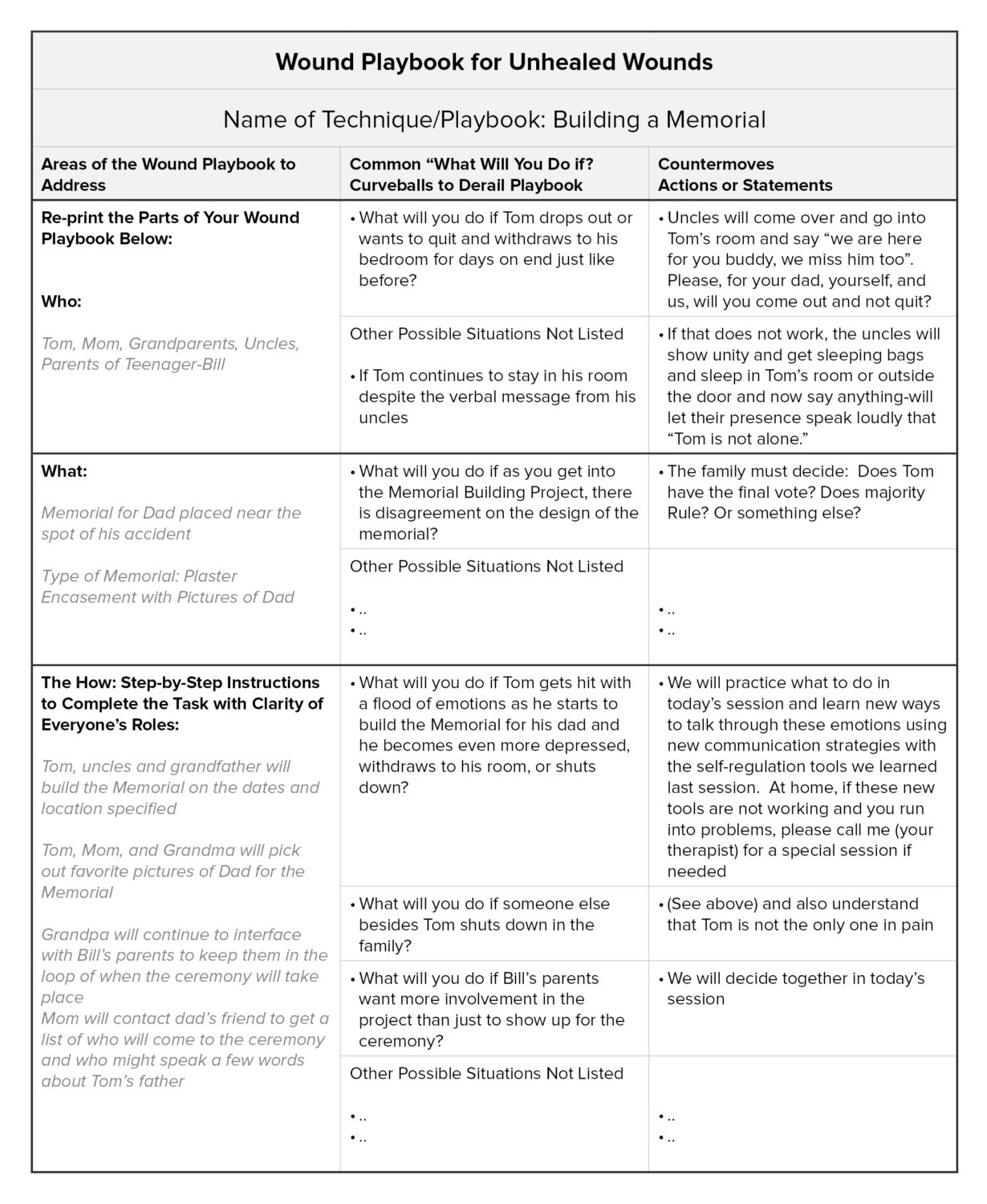Treatment with traumatized families and children will often fail when the trauma therapist fails to both troubleshoot “what will you do if?” scenarios with the FST Trauma Playbook (i.e., what will you do if your child refuses to go on a special outing with you?) and conduct dress rehearsals with both the parent or caregiver in delivering the Trauma Playbook.
In response, the Family Trauma Institute using the FST | Family Systems Trauma Model developed what are called Troubleshooting Countermove Checklists and a template to conduct dress rehearsals with your parents.
FST Troubleshooting
Our research shows that the family must successfully implement the Trauma Playbook a minimum of 30 days before permanent change in the child’s problem symptoms is possible. During this 30-day transition period, the risk for relapse is high for both the child and family.
And to counter this risk, the FST Model uses the technique of a “troubleshooting checklist” to proactively prevent relapses before they occur. After the trauma playbook is typed up, the next step is to create a troubleshooting countermoves checklist template to complement the trauma playbook. Table 1 illustrates what a typical troubleshooting checklist looks like using the Trauma Playbook.
Table 1: Troubleshooting Checklist – Building a Memorial Trauma Playbook

As illustrated in this case example, the FST therapist will take this template and use it as a guide to fill in the most likely curveballs and countermoves from the trauma playbook created in Phase III: Co-Create Trauma Playbooks of the FST Model. In this case example, the trauma playbook is called “Building a Memorial” to help Tom (the traumatized child) and his entire family heal from the trauma of unresolved grief due to the sudden and unexpected death of Tom’s father by a drunk driver.
The Family Systems Trauma (FST)-trained therapist then offers suggestions (within the countermoves column) that will either lead into role plays (“We will practice today how to talk to your son Tom if he is overcome with grief”) or problem-solving (“If a family member forgets to show up on Saturday or Sunday, just remind them for next week”).
As part of the troubleshooting technique, the FST therapist will actively suggest countermoves by writing them on this template immediately prior to the session. Without these jump start suggestions, the family is lost on how to start or what to do. Or, the session can easily digress into an unproductive brainstorming session. Within the session itself, these suggestions can always be rejected, altered, or modified by the family. However, the benefit is that it provides both therapist and family quick footing for next steps.

See chapters 10 and 11 of Treating the Traumatized Child: A Step-by-Step Family Systems Approach for a detailed outline of the steps needed to successfully troubleshoot and use dress rehearsals for your complex trauma cases.
Dress Rehearsals
The troubleshooting countermoves checklist is used as the road map to practice dress rehearsals. Without the child present, the FST therapist will playfully play the part of the child and throw out different curveballs from the checklist to the parent, caregiver, or extended family member to see how they response. After each mini dress rehearsal, everyone evaluates how each party performed and if needed redo the same dress rehearsal until everyone feels that it is a success. The following transition statement is used to introduce this concept:
Now that we have your countermoves checklist our next step is to practice our delivery of your trauma playbook (through dress rehearsals or role-plays). Actors and football teams do the same thing. Actors use dress rehearsals to practice their lines before opening night and football teams practice the plays in their playbooks over and over again before game day.
In the same way, we are going to do dress rehearsals (or role-plays or practice rounds) to practice the delivery of your trauma playbooks so you will be ready to use it when you walk out this door. To begin, we will look at your countermoves to practice one at a time. Once we practice it and master it, we will move on down the list. We may not have time to do every single one, but we will hit the main pressure points.
After we practice our delivery (do our role-play, do our dress rehearsal), I will ask everyone to rate our performance on a scale of 1 to 5 (1 = not close to a good delivery and we need more practice and 5 = great delivery and ready to go forward). If there is a low score, we can practice a few more rounds to get it right.
Just like a director in a movie, I will yell “freeze” when I want us to stop or if we need more practice. I will also say, “that’s a wrap” when everyone likes what they see and we can move on to the next curveball on the list.
After we all feel the dress rehearsals are a success, we will bring in your child or teenager and they will play themselves as you practice your moves with them from the checklist using your trauma playbook.
Conclusion
Troubleshooting and dress rehearsals are arguably the two most unused and overlooked parts of trauma treatment and why so many of our clients and families relapse so badly. The old saying “it’s not what you say but how you say it” applies here. Our clients and families have gone months or years of both poor timing and dysfunctional interactions with one another and between part and child. These negative feedback loops from a systems lens either cause the trauma or to remain unhealed. Therefore, to ask then to execute a plan without intensive and well executed dress rehearsals or role plays is a set up for failure and must addressed through these two FST techniques working in tandem.
A Success Path to Become a Family Trauma Expert
If you want to learn how to use this technique and others in the FST Model, join our FST Digital Advanced Training Course. Brief 20-minute course module videos will demonstrate the application of these techniques with real traumatized families as well as workbook handouts that you will use to achieve immediate results the next day at work.
About the Author
Scott P. Sells, Ph.D., MSW, LCSW, LMFT, is the author of three books, Treating the Tough Adolescent: A Family-Based, Step-by-Step Guide (1998), Parenting Your Out-of-Control Teenager: 7 Steps to Reestablish Authority and Reclaim Love (2001), and Treating the Traumatized Child: A Step-by-Step Family Systems Approach (2017). He can be contacted at spsells@familytrauma.com or through LinkedIn and Facebook.

